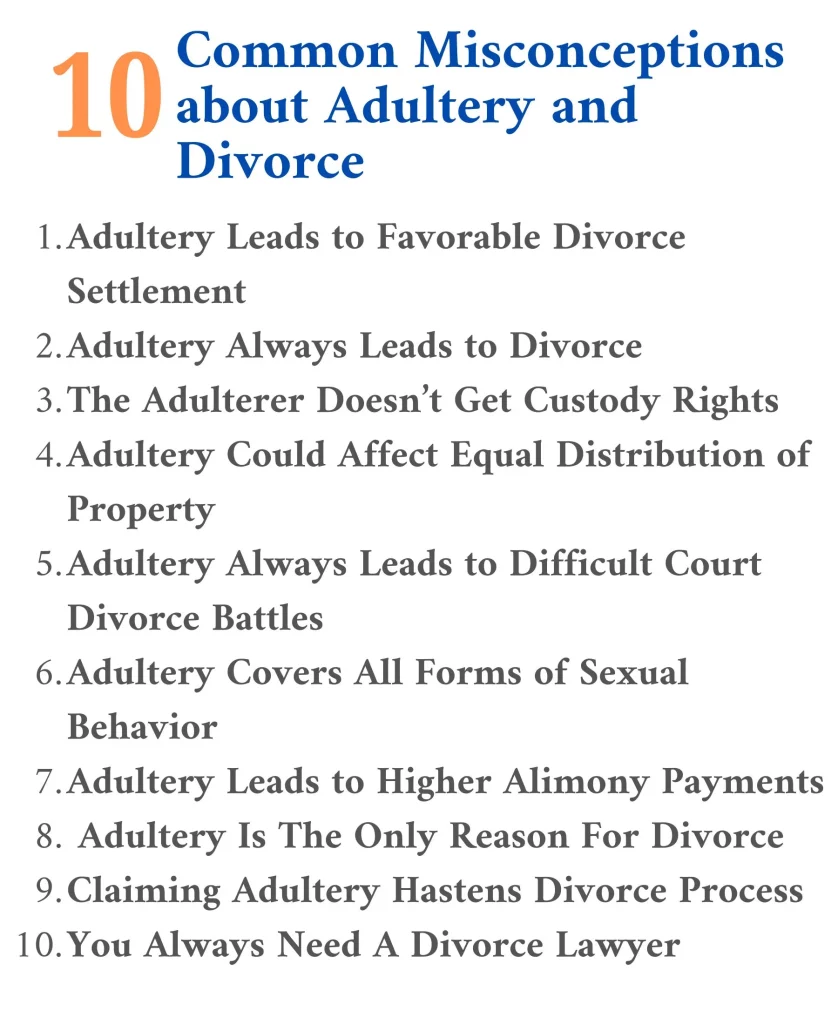
Providing Divorce Mediation Services Throughout California
Providing Divorce Mediation Services Throughout California
Home » Divorce and Family law Blog » 10 Misconceptions About Adultery and Divorce – Addressed

There are a ton of misconceptions out there on the internet when it comes to cheating (adultery) during marriage.
There seems to be even more misconceptions as to the impact an affair has on divorce proceedings.
Let’s set the record straight. We’ll discuss how affairs and adultery will not impact your divorce proceedings, and when it actually might.
Did your spouse cheat on you during your marriage and you are considering a divorce or legal separation? You should reach out to Dina Haddad, a divorce mediator who can help you.
Her office provides FREE Divorce Mediation Consult, weekly, so that their mediators can assess your matter and help you decide how to proceed.
California is a “no-fault” divorce state. California residents are entitled to a divorce regardless of the reasons.
California courts are not interested in why unless there is direct harm to the spouse or children. As a result, cheating as a concept Adultery does not legally impact divorce.
According to Merriam-Webster, adultery is defined as; “voluntary sexual intercourse between a married person and someone other than that person’s current spouse or partner.” The key part of the definition is that one of the party’s is married.
Marital infidelity does not impact property division, spousal support, or child custody. The only grounds needed for divorce in California are “irreconcilable differences.”
Even if you have evidence of the cheating, your spouse will not be punished financially. They will also not lose any rights to assets or custody of the children involved.
However, there are outliers or round-a-bout methods in which cheating can come into a divorce dispute.
Let’s say that Alexa spent community money on her affair partner. She bought hotel rooms, gifts, and paid for expensive trips. Max (her husband) might be able to claim reimbursement.
Similarly, a new romantic interest can be a factor in determining the child’s schedule. For example, if Alexa’s affair partner is abusive to the children or negligent. This can affect Alexa’s custodial time.
Back in the 1970’s, California did actually recognize divorce on the grounds of adultery along with other fault-based grounds like abandonment, cruelty, and other marital misconducts.
But California became one of the first states to implement no-fault divorce with the Family Law Act. With the no-fault system, courts now recognize that marriages can fail without either party being legally at fault.
The courts moved away from fault divorce so that they are not arbitrators of right and wrong. Rather, they want to focus more on resolving the issues at hand, asset division, child custody, and support.
Expert divorce attorney mediator, Dina Haddad has addressed some of these common misconceptions about adultery and divorce by providing reality in this way

Most people when they are in the process of divorce think that they can present their proof of an affair to the court and get favored.
You might think that your spouse will be punished by the courts through reduced rights, and increase your alimony payment.
But this stems from outdated fault-based divorce laws and media portrayals of cases from other states.
Today’s media portrays cheating or having an affair as a deal breaker. But for a lot of couples, they will at least try to work through it.
It can be an emotionally charged and even traumatic thing to go through when you realize that your partner has betrayed your trust in such a way.
This doesn’t mean that your marriage is over, though. There are family therapists who have hands-on experience with couples who go through similar situations, and they can help.
It’s all about if you are willing to build your trust with your partner again and if you have a marriage that (in your eyes) is worth saving.
If you are considering marital therapy, we suggest Dr. Invia Betjoseph and his team of therapists at San Jose Counseling.
Courts will not look at an affair and immediately revoke custody from the other parent. Yes, cheating is a tragic thing and it can have a deep impact on your family – especially the children.
But courts will look into the child’s best interest. Most of the time, what is in the children’s best interest is having both parents present and involved in their children’s lives.
The only reason that they might consider reducing the other parents custody rights is if their affair partner has a history of child abuse or poses a threat to your children.
If you have committed adultery, admitting that will not deny you of equal distribution of your property when you are getting a divorce.
You might have to pay back what you spent on your affair partner to your spouse as a reimbursement (and you can even offer to do that as well).
Otherwise, adultery does not impact the distribution of property.
When you think of someone cheating in a marriage, you probably expect to see a high-conflict, long-drawn out mess of a divorce.
This is another popular misconception that derives from drama tv shows or novels.
Most people who go through cheating just want the divorce to be over with so they can move on with their lives and heal.
Many believe that any form of sexual misconduct qualifies as adultery.
Sometimes these behaviors like sexting and flirting are inappropriate behaviors and do not qualify as adultery. Sometimes, these are considered an emotional affair. Regardless, they can definitely damage your marriage, in particular the marital trust.
You might be compelled to collect evidence of your spouse having a dating app profile and screenshots of intimate (or suggestive) messages / social media interactions.
But these are not considered as legal factors in a divorce. However, these feelings and emotions are real and may be part of settlement discussions.
Alimony (spousal support) is a court-ordered payment from one spouse to another after divorce.
It helps you maintain a similar standard of living that you established during your marriage. Despite popular belief, adultery doesn’t actually have an impact on alimony calculations.
The court uses these factors to calculate your alimony:
Related: How to Avoid Paying Alimony?
Adultery is not the only reason that people get divorced. There are many reasons. Financial disagreements. Emotional needs are not being met.
Differing views on parenting. Going in different directions. Everyone has different experiences in marriage that may lead them to a divorce.
By going to court and claiming that you were cheated on, you are not going to get divorced any faster.
Just like everyone else – you will have to wait your turn. Divorce is never a cut and dry process that can just happen in a day.
There are so many things that the courts need to look into so that they can make sure you and your spouse have equally divided assets before letting you walk away to finalize things.
You do not always need a lawyer in a divorce, especially if you are actively trying to avoid going to court and deciding on alternative approaches like mediation or a DIY divorce.
There are plenty of other services out there that can help you stay navigate a divorce when an affair has occurred. For example, let’s look at mediation. If you or your spouse is still emotional about the marriage ending, mediating may provide you a forum to manage the emotions while still moving forward in your divorce. Mediation allows for more open dialogue and creative solutions.
Divorce mediation is the most productive path for divorcing a cheating spouse in California.
Since adultery has no legal impact or ramifications, spending the time and money fighting in court over infidelity leads to wasted resources on top of your emotional stress.
Mediation offers so many advantages when your case is involved in an infidelity:
Read More: 10 Questions to Ask a Cheating Spouse
Related: How to Leave a Marriage Peacefully?
And these are just a few of the advantages. If you want to know more, you should reach out to Dina Haddad, a professional mediator at Families First Mediation. They have years of experience with cases just like yours and can provide you with a FREE Divorce Mediation Consultation if you reach out to them today.
Overall don’t let today’s media representation of what divorce should be fool you.
There are so many misconceptions out there on the internet today – it’s important that you do your research.
Adultery is emotionally devastating, and is a top contributor for divorce. But even if you or your spouse didn’t cheat, you can still get a divorce in California.
No matter your situation if you are not happy in your marriage, you just aren’t. You don’t need to explain yourself to the court.
In California it doesn’t play a legal role. But you might face some emotionally difficult challenges due to it.
According to Forbes Advisor: “60% of divorced couples cited infidelity as a reason for their divorce.
Infidelity can be used to describe anyone who cheats on someone they are dating. However, the term adultery is specifically used in cases of someone having an affair during their marriage.


Families First Mediation is a pioneer in the field of divorce mediation. Our entire divorce mediation team takes great pride in being active trainers, divorce mediators and teachers of mediation in the greater California area. If you are considering a collaborative divorce, legal seperation or looking for a san jose divorce lawyer we have services that may be beneficial to you. Take advantage of our vast expertise and background in the field of divorce mediation and our genuine desire to help with your divorce mediation services.